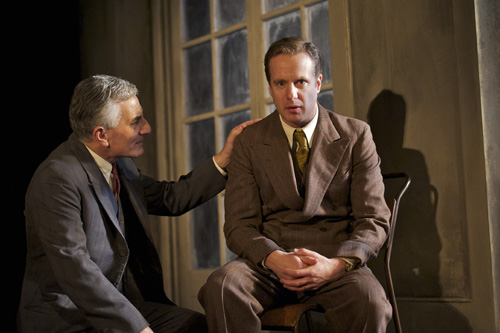
There’s a strange alchemy that happens while watching Michael Frayn’s 1998 tour de force Copenhagen. For a few moments a bookish theatre audience can become convinced that they understand theoretical physics. It’s an illusion that disappears almost as soon as the houselights are up but it’s a rather brilliant trick. Copenhagen takes us back to a decisive moment in 1941 when German physicist Werner Heisenberg comes to occupied Denmark to visit his former mentor, leading quantum theorist Niels Bohr. While the half-Jewish Bohr fears deportation to the Nazi death camps, Heisenberg is working closely with the German government on the practical application of nuclear fission, which ultimately can mean only one thing – the bomb.
But why has Heisenberg returned to his teacher and ‘father confessor’ at this crucial moment? To get his blessing to pursue the upper reaches of physics no matter what the human cost? To sniff out whether Bohr has been aiding the allies with their own nuclear experiments? Or simply for help with his diffusion calculation? The complex motivations of each man are delineated by the play’s repeated restaging of this meeting in some sort of metaphysical limbo long after the protagonists have died. We trace their paths and collisions like a pair of electrons in a cloud chamber. Luckily for the audience we have an ally in Margrethe, Bohr’s long-suffering wife who, although she has typed-up all of his research, still provides a reason for these top academics to explain things in plain(ish) English.
There’s no doubt this is a stunning play and its richly dense dialogue, full of repeated motifs, echoes and riffs, forms a complex harmony of science, history and ethics. Essentially the evening consists of three people in a room talking and yet conceptually it swings between the micro-level of particle physics to the macro level of world war. Bohr and Heisenberg are at once mentor and protégé, father and son, Jew and Gentile, past and future. The three actors bounce around the stage like the different elements of the atom, each at one time taking the centre while the other two spin around them.
Given the complexity and sheer quantity of the dialogue, Copenhagen is a challenge for any actor and Henry Goodman as Bohr occasionally falters under the weight of it. Still he maintains a credible performance as a brilliant man who can’t quite come to terms with the real implications of his beloved theories. Geoffrey Streatfield’s Heisenberg shimmers with ambiguities; he is gauche and arrogant, brilliant and blinkered, a man with the weight of history on his shoulders, but still a little lost boy. Barbara Flynn Margrethe provides a foil to the academic discourse, showing a greater level of emotional intelligence than either of these geniuses can muster.
Despite its elegant writing and fine performances there are times when this production fails to take-off. It suffers from not being staged in the round, with the audience seated like electrons circling a dramatic nucleus. Jonathan Fensom’s drab set, boxed in by the proscenium arch, leaves the actors to create all the momentum in the verbose script, only aided by the odd portentous rumble of Gregory Clarke’s sound design. But despite some reservations about David Grindley’s production Copenhagen does something revelatory. It dramatises big ideas in a way that no academic paper, science documentary or even novel could, constantly bringing physics and philosophy back to the human scale.
Copenhagen runs at the Lyceum Theatre until Saturday 10 March.
It is part of a Michael Frayn season which runs until 31 March.